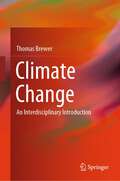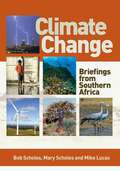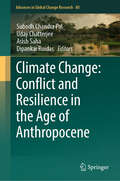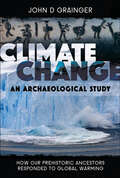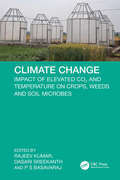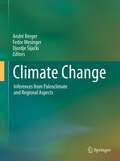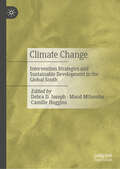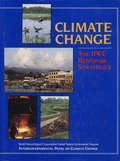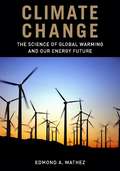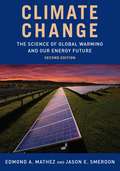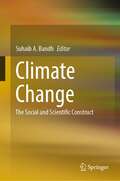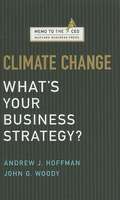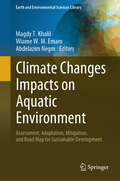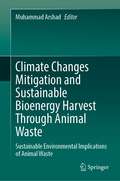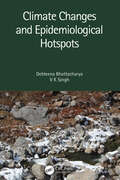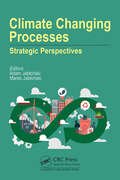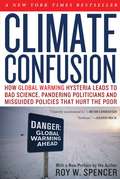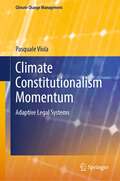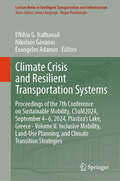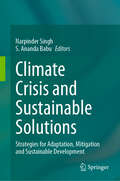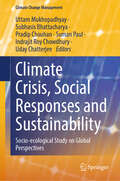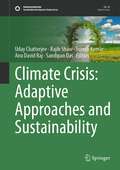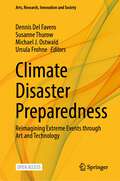- Table View
- List View
Climate Change: An Interdisciplinary Introduction
by Thomas BrewerThis textbook introduces and explains the issues around climate change and its mitigation. It includes topics across disciplines and can be used as a single-volume text by students studying a range of subjects. Among the topics included are: ·How to adopt significant mitigation measures now to avoid the most catastrophic long-term consequences of climate change.·Reducing the rates of highly potent, short-lived emissions of methane gas and black carbon particulates—reductions that are necessary to meet the temperature targets of the Paris Agreements.·Implementing wide-ranging adaptation measures to reduce the deaths and economic costs of extreme heat waves, droughts, wildfires, hurricanes, and floods.·Recognizing the unusually rapid warming in the Arctic, which is disrupting weather patterns in the northern hemisphere and currents in the Atlantic Ocean, causing world-wide sea-level rise, and also causing methane leaks in the Arctic region—leaks that could eventually lead to irreversible global warming consequences. Meeting these challenges effectively requires action by both governments and businesses. The book examines the national and local governmental policies—and business practices—that are needed in sector-specific chapters. An objective of the book is to inform readers about specific problems resulting from climate change—and the wide range of potential government policies and business practices, changes in technologies, and changes in public attitudes and actions that can reduce the emissions and otherwise lessen their impacts. Indeed, a central message is that understanding the issues posed by climate change requires no less than an understanding of climate science, micro- and macro-economics, technologies for mitigation and adaptation measures, as well as politics and law at many governmental levels from local to global. The author has included short case studies that illustrate and integrate multiple analytic perspectives. The book is therefore appropriate for students, professionals, and general audiences with wide-ranging interests and backgrounds.
Climate Change: Briefings from Southern Africa
by Robert (Bob) Scholes Mary Scholes Mike LucasClimate change affects us all, but it can be a confusing business. In this book, three scientists with several decades of experience in assessing the potential effects of climate change for the southern African region share their insights. Complex issues are dealt with in plain language, without oversimplification and with attention to accuracy. The material is up-to-date as is possible in such a fast-developing field.Climate Change: Briefings from Southern Africa takes the form of 55 'frequently-asked' questions', each with a brief and clear reply. It is illustrated with colour diagrams and photographs, and examples are tailored to the regional context. The authors' introduction provides an overview of current national and international policies aimed at regulating climate change. The content is divided into four sections, which take the reader through the science of how climate system works; the projected impacts in southern Africa during the twenty-first century; what this means for the South African economy and society; and what can be done to avoid harm. The briefings can be read alone or in sequence.The year 2015 is regarded as a watershed for global climate change action if a global average temperature rise of more than two degrees abbove the pre-Industrial level is to be avoided. This book provides compelling evidence that the impact on agriculture, fisheries, water resources, human health, plants and animals as well as sea levels will be dangerous. However, the book ends on a positive note by offering advice on how the world can avoid such bleak outcomes, while allowing a good life for all.The volume is aimed at interested non-scientists, including business people, decision-makers, ordinary citizens and students
Climate Change: Conflict and Resilience in the Age of Anthropocene (Advances in Global Change Research #80)
by Uday Chatterjee Subodh Chandra Pal Asish Saha Dipankar RuidasThis book illustrates a geospatial technology approach to data mining techniques, data analysis, modelling, risk assessment and visualization and management strategies in many elements of natural and societal hazards. This book delves into cutting-edge techniques based on open-source software and R statistical programming, Google Earth Engine and modelling in modern artificial intelligence techniques, with a particular emphasis on recent trends in data mining techniques and robust modelling in water resource crisis-related hazards. Furthermore, this book also discusses how to manage water resources at various local, regional and international levels while incorporating environmental considerations. This book contains works that address the connection between climate change, extreme events and resilience. These works include those that identify and evaluate policies, quantify the effects of public interventions, climate change on extreme events, describe the decision-making process and its role in modelling for resilience. This book's subjects be of interest to earth and environmental scientists, professionals and authorities. This book focuses at geospatial modelling and climate change management. A relationship between three technologies, including remote sensing (RS), geographic information systems (GIS) and the R programming environment, is acknowledged as particularly effective in this regard. This book, on the other hand, serves as a practical guide to identify the most recent breakthroughs in geospatial and geostatistical approaches and their application in the field of subsurface water-induced hazards throughout the world. This book is specifically designed to serve the community of Undergraduates, Postgraduates and Researchers, Policymakers, Environmentalists, Natural Hazards and Disasters Management, NGOs, Corporate Sectors, Social Scientists, and Government Organizations in the fields of Environmental Sciences, Geography, Hydrology, Natural Hazards, Geospatial Sciences, Remote Sensing & GIS, Agriculture, Crop-Science, Forestry, Soil Science, Agronomy, Humanistic & Social Sciences and so on.
Climate Change: How Our Prehistoric Ancestors Responded to Global Warming
by John D. GraingerHow prehistoric humans coped with the end of the last Ice Age—and catastrophic global warming.Global warming is among the most urgent problems facing the world today. Yet many commentators, and even some scientists, discuss it with reference only to the changing climate of the last century or so. John Grainger takes a longer view and draws on the archaeological evidence to show how our ancestors faced up to the ending of the last Ice Age, arguably a more dramatic climate change crisis than the present one. Ranging from the Paleolithic down to the development of agriculture in the Neolithic, the author shows how human ingenuity and resourcefulness allowed them to adapt to the changing conditions in a variety of ways as the ice sheets retreated and water levels rose. Different strategies, from big game hunting on the ice, nomadic hunter gathering, sedentary foraging, and finally farming, were developed in various regions in response to local conditions as early man colonized the changing world. The human response to climate change was not to try to stop it, but to embrace technology and innovation to cope with it.
Climate Change: How Our Prehistoric Ancestors Responded to Global Warming
by John D. GraingerHow prehistoric humans coped with the end of the last Ice Age—and catastrophic global warming.Global warming is among the most urgent problems facing the world today. Yet many commentators, and even some scientists, discuss it with reference only to the changing climate of the last century or so. John Grainger takes a longer view and draws on the archaeological evidence to show how our ancestors faced up to the ending of the last Ice Age, arguably a more dramatic climate change crisis than the present one. Ranging from the Paleolithic down to the development of agriculture in the Neolithic, the author shows how human ingenuity and resourcefulness allowed them to adapt to the changing conditions in a variety of ways as the ice sheets retreated and water levels rose. Different strategies, from big game hunting on the ice, nomadic hunter gathering, sedentary foraging, and finally farming, were developed in various regions in response to local conditions as early man colonized the changing world. The human response to climate change was not to try to stop it, but to embrace technology and innovation to cope with it.
Climate Change: Impact of Elevated CO2 and Temperature on Crops, Weeds and Soil Microbes
by Rajeev Kumar Dasari Sreekanth P S BasavarajClimate Change: Impact of Elevated CO2 and Temperature on Crops, Weeds and Soil Microbes is a comprehensive and timely volume that explores the profound effects of climate change, specifically elevated CO2 and temperature on plant physiology, crop productivity, weed dynamics, and soil microbial interactions. The primary objective of this book is to provide a detailed and up-to-date overview of the physiological, biochemical, and molecular mechanisms governing crop responses to elevated CO2 and temperature. It also examines the impact on weeds and soil microbial communities, highlighting potential adaptation and mitigation strategies for sustainable agriculture. Readers will gain valuable insights into the latest methodologies and scientific advancements in this field.This volume offers in-depth coverage of key topics, including: Impact of elevated CO2 and temperature on the physiology, yield, and quality of major crops Responses of cereals, pulses, oilseeds, and vegetables to elevated CO2 and temperature Nutritional and quality changes in food crops under climate change scenarios Growth dynamics and physiological responses of weeds under elevated CO2 and temperature Role of soil microbes in plant health and ecosystem stability in changing climates Influence of elevated CO2 and temperature on key metabolic pathways, including photosynthesis, transpiration, redox metabolism, carbon metabolism, and nitrogen metabolism Adaptive mechanisms in crops, including osmo-protectant accumulation, phytohormonal regulation, and mitigation strategies for climate resilience As a significant contribution to climate change and plant science research, this book serves as an essential resource for plant physiologists, agronomists, environmental scientists, soil microbiologists, geneticists, and students. It is a valuable reference for researchers and professionals working on climate adaptation strategies in agriculture and can also be used in coursework for graduate and postgraduate studies.
Climate Change: Inferences from Paleoclimate and Regional Aspects
by André Berger Djordje Sijacki Fedor MesingerExperts in climate and water sciences from Canada, the United States, Brazil, Denmark, Germany, Belgium, France, Serbia, and other European countries and the UNESCO gathered at the Serbian Academy of Sciences and Arts on the occasion of the 130th birthday anniversary of the geophysicist Milutin Milankovitch. The collection of their presentations is opened by an update on the climate situation after the Fourth Assessment Report of the Intergovernmental Panel on Climate Change. Further topics include various issues of paleoclimatology, in particular as it helps reduce uncertainties from which prospects for climate change suffer; ecohydrology and climate change at the watershed scale; and regional climate models, which are discussed in terms of both their improved modeling and their use in studies of a polynya in the Antarctica and expected changes in the Mediterranean region.
Climate Change: Intervention Strategies and Sustainable Development in the Global South
by Camille Huggins Debra D. Joseph Maud MthembuThis book highlights the challenges with respect to climate change in the Global South. It demonstrates what has been happening in varying countries in this geographic location and how sustainable adaptation interventions could be used to alleviate these challenges. Most countries in the Global South are extremely vulnerable and unprepared for the present and future impact of climate change. Some climate change events that are presently plaguing these locations are extreme weather events such as flooding, food insecurity, disasters and droughts. The book provides case studies and interventions that can be a source to others who are seeking to find solutions to these adverse climate change events.
Climate Change: The Ipcc Response Strategies
by Intergovernmental Panel on Climate ChangeClimate Change is the report of Working Group III of the Intergovernmental Panel on Climate Change (IPCC), established in 1988 by the World Meteorological Organization and UNEP to address the threat of global warming on an international scale.
Climate Change: The Science of Global Warming and Our Energy Future
by Edmond A. MathezClimate Change is geared toward a variety of students and general readers who seek the real science behind global warming. Exquisitely illustrated, the text introduces the basic science underlying both the natural progress of climate change and the effect of human activity on the deteriorating health of our planet. Noted expert and author Edmond A. Mathez synthesizes the work of leading scholars in climatology and related fields, and he concludes with an extensive chapter on energy production, anchoring this volume in economic and technological realities and suggesting ways to reduce greenhouse-gas emissions. Climate Change opens with the climate system fundamentals: the workings of the atmosphere and ocean, their chemical interactions via the carbon cycle, and the scientific framework for understanding climate change. Mathez then brings the climate of the past to bear on our present predicament, highlighting the importance of paleoclimatology in understanding the current climate system. Subsequent chapters explore the changes already occurring around us and their implications for the future. In a special feature, Jason E. Smerdon, associate research scientist at Lamont-Doherty Earth Observatory of Columbia University, provides an innovative appendix for students.
Climate Change: The Science of Global Warming and Our Energy Future
by Jason SmerdonThis second edition of Climate Change is an accessible and comprehensive guide to the science behind global warming. Exquisitely illustrated, the text is geared toward students at a variety of levels. Edmond A. Mathez and Jason E. Smerdon provide a broad, informative introduction to the science that underlies our understanding of the climate system and the effects of human activity on the warming of our planet.Mathez and Smerdon describe the roles that the atmosphere and ocean play in our climate, introduce the concept of radiation balance, and explain climate changes that occurred in the past. They also detail the human activities that influence the climate, such as greenhouse gas and aerosol emissions and deforestation, as well as the effects of natural phenomena. Climate Change concludes with a look toward the future, discussing climate model projections, exploring the economic and technological realities of energy production, and presenting a view of the global warming challenge through the lens of risk. Each chapter features profiles of scientists who advanced our understanding of the material discussed. This new edition expands on the first edition’s presentation of scientific concepts, making it ideal for classroom use for a wide swath of undergraduate and masters students with both science and nonscience backgrounds.
Climate Change: The Science of Global Warming and Our Energy Future
by Jason SmerdonClimate Change is geared toward a variety of students and general readers who seek the real science behind global warming. Exquisitely illustrated, the text introduces the basic science underlying both the natural progress of climate change and the effect of human activity on the deteriorating health of our planet. Noted expert and author Edmond A. Mathez synthesizes the work of leading scholars in climatology and related fields, and he concludes with an extensive chapter on energy production, anchoring this volume in economic and technological realities and suggesting ways to reduce greenhouse-gas emissions.Climate Change opens with the climate system fundamentals: the workings of the atmosphere and ocean, their chemical interactions via the carbon cycle, and the scientific framework for understanding climate change. Mathez then brings the climate of the past to bear on our present predicament, highlighting the importance of paleoclimatology in understanding the current climate system. Subsequent chapters explore the changes already occurring around us and their implications for the future. In a special feature, Jason E. Smerdon, associate research scientist at Lamont-Doherty Earth Observatory of Columbia University, provides an innovative appendix for students.
Climate Change: The Social and Scientific Construct
by Suhaib A. BandhBeginning in the second half of the twentieth century, the impacts of climate change have been fierce, causing loss of human life and irreparable destruction to natural and man-made infrastructure in many parts of the world.The difference between climate change now and in the past is that of sudden and disproportionate disruption of the natural energy dynamics by the changing consumption patterns of billions of human beings who have polluted terrestrial and aquatic ecosystems. The picture that emerges from the exhaustive analysis of international data drawn from the most reliable sources indicates that we have possibly gained access to the gateway of extinction and it is time that we take corrective steps immediately.Global climate change is further altering our relationship with the environment, modifying relatively stable climatic factors and making them uncertain, unpredictable, and threatening. Changes in land use and an increasing demand for water resources due to climate change have affected the capacity of ecosystems to sustain food production, ensure the supply of freshwater resources, provide ecosystem services, and promote rural multi-functionality. Ensuring food production does not just depend on increasing water efficiency, promoting climate resilient crop production, or reducing land-use competition for urbanization but also on a more suitable and stable climate as the changes in climatic factors like precipitation, temperature, radiation, evaporation, and wind bring about some major shifts in global food supplies. According to Special Report on Emission Scenarios (SRES), focused on greenhouse gas emissions projections, and Representative Concentration Pathways (RCPs) conducted by the Intergovernmental Panel on Climate Change (IPCC), climate change increases the risk of simultaneous crop failures (including corn, rice, legumes, and vegetables) if irrigation systems are not fully adapted to water stress situations. A changing climate could have many adverse impacts on other sectors of our environment. This book offers concrete, up-to-date, and appropriate study cum research material for students, researchers, academicians and policymakers. It will be of a greater interest to students and researchers in the field of environmental science, agriculture science, agronomy, and sustainable development.
Climate Change: What's Your Business Strategy?
by Andrew J. Hoffman John G. WoodyBelieve or not, climate change is one of the most pressing challenges facing the world today. Most of all, it is quickly becoming a crucial business issue. But how will you and your company respond? You need fast and reliable advice from the world's foremost experts. Climate Change delivers just that: four strategies from two MBA professors with broad and deep experience with environmental issues. Climate Change gives you a first-hand look at how world-class thinkers would react to this pressing issue if they were in your shoes. From our new Memo to the CEO series - solutions-focused advice from today's leading practitioners.
Climate Changes Impacts on Aquatic Environment: Assessment, Adaptation, Mitigation, and Road Map for Sustainable Development (Earth and Environmental Sciences Library)
by Abdelazim Negm Magdy T. Khalil Wiame W. M. EmamThis book provides a detailed and a clear picture about the impact of climate changes on all aspects of our lives. The book will shed some lights on the challenges and obstacles that agricultural development in different countries are going through regarding the dimensions of food security due to climate change. The vulnerability of agricultural system will be discussed and the methods to adapt to some impacts of climate change will be projected. Some authors will focus on how Global Climate change may directly or indirectly affect the water cycle and, consequently, the quantity and quality of water resources needed to meet human and environmental demands. It can lead to recurrent floods and droughts, rising sea water levels with serious effect on coastal aquifers, and extreme water temperatures that can exacerbate many forms of water pollution. Water supply reliability, health, agriculture, energy, biodiversity and aquatic ecosystems will all suffer the impact of such challenges.The demand for water to meet these needs is also affected by climate change. Evidently, adopting a holistic water-energy-food nexus approach, while promoting the use of non-conventional water resources, can better support a transition to sustainability, a fact that should appeal to national interest and encourage governments, the private sector and civil society to engage. The results of the Climate changes conference; COP 27 that held in Sharm El-Sheikh in 2022, will be discussed in some chapters to illustrate the several efforts that have been taken by some countries to adapt to climate changes, including continuous breeding program to produce crops adapted to higher temperature, salinity, shorter in life cycle, and better in post-harvest and shelf life. The efforts to improve on farm water management and reduce water consumption in agriculture to increase water productivity will be discussed. Saving water from agriculture will be associated with saving fertilizers to control GHG emissions and could allow allocating water for land reclamation. Some Chapters aim at highlighting the impact of climate change on water resources depending on a clear understanding of how climate, fresh water, and biophysical and socio-economic systems are interconnected at the global and regional scales, meanwhile presenting state-of-the-art technologies and innovative/holistic solutions for adaptation and mitigation measures, and increasing the resilience of vulnerable communities to climate change, with the ultimate goal of achieving sustainable development towards “the future we want” while “leaving no one behind.
Climate Changes Mitigation and Sustainable Bioenergy Harvest Through Animal Waste: Sustainable Environmental Implications of Animal Waste
by Muhammad ArshadThe valuable characteristics of animal waste materials in terms of climatic change impact and bioenergy production are discussed in this book. Reutilization of such wastes for bioenergy harvest is the prime focus; the great need for future animal waste recycling is also depicted.Major topics discussed are types of livestock waste – poultry and dairy, methods and management of waste utilization and storage, application of animal waste in bioenergy production, economics of waste utilization, novel disposable techniques, circular bioeconomy, pollution, and water quality. Furthermore, utilization of animal waste for resource conservation and environmental protection is discussed, such as potential materials for green biochemicals. Resource recovery can, therefore, forestall the shortage of natural resources and, at the same time, can greatly reduce waste-disposal problems and energy crises. Many alternatives to waste disposal, either currently available or under study, focus on the recovery of material or energy. In a world of diminishing resources and increasing needs, each opportunity for the recycling of animal waste materials has been examined.This book significantly contributes toward climate change mitigation through better environmental solutions. A better understanding of animal waste recycling to mitigate climate changes has been portrayed in order to generate discussions among researchers and administrators. Environmental implications of animal waste are of prime importance in climate change scenario. Such wastes also harbor zoonotic pathogens that are transported in the environment.Finally, it has been tried out to collect ideas and experience in multiple aspects of animal waste management for climate change mitigation and bioenergy harvest.
Climate Changes and Epidemiological Hotspots
by V K Singh Debleena BhattacharyaClimatic change plays an integral part in planetary health and is amongst the most important global environmental aspect that has an impact on human health. The linkage between the environmental change and disease dynamics has been highlighted in recent times and hence, emphasis on environmental sustainability to reduce future epidemics. Present book focusses on the relationship between climatic change and epidemiological factors with an approach to reduce the global hotspots. The climatic changes relevant to periods of activity and variations in geographical distribution is addressed including interconnection of sustainability, population growth and environmental change. Features: Covers environmental management and waste to resource for future. Includes guidelines for analysis, assessment, and interventions for waste management. Discusses environmental impediments in the way of healthcare inclusions. Impresses upon the importance of clinical epidemiology to detect, treat, control, and prevent the spread of non-communicable diseases globally. Provides insights for the future health hazards that can be administered at the insignificant stage. This book aims at Graduate Students, Researchers, Professionals and Health Care Professionals in environmental engineering, waste management, climate change, and healthcare.
Climate Changing Processes: Strategic Perspectives
by Adam Jabłoński Marek JabłońskiThe aim of the monograph is to present a modern and innovative approach to the issues of dysfunctions of economic and social ecosystems caused by climate anomalies. The deformation of the economic and social system caused by climate change has a surprising dimension and the degree of impact of climate change on the organizational behavior of various types of entities determines in many cases their ability to survive. Survival does not apply to all organizations, but only to those that are able to make appropriate, effective and efficient decisions in an environment of many crises. They should result from the logic, methodology of the conceptual framework adequate for the management mechanisms of a given type of organization, taking into account sectoral conditions.
Climate Confusion
by Roy W. SpencerThe current frenzy over global warming has galvanized the public and cost taxpayers billons of dollars in federal expenditures for climate research. It has spawned Hollywood blockbusters and inspired major political movements. It has given a higher calling to celebrities and built a lucrative industry for scores of eager scientists. In short, ending climate change has become a national crusade.And yet, despite this dominant and sprawling campaign, the facts behind global warming remain as confounding as ever.In Climate Confusion, distinguished climatologist Dr. Roy Spencer observes that our obsession with global warming has only clouded the issue. Forsaking blindingly technical statistics and doomsday scenarios, Dr. Spencer explains in simple terms how the climate system really works, why man's role in global warming is more myth than science, and how the global warming hype has corrupted Washington and the scientific community.The reasons, Spencer explains, are numerous: biases in governmental funding of scientific research, our misconceptions about science and basic economics, even our religious beliefs and worldviews. From Al Gore to Leonardo DiCaprio, the climate change industry has given a platform to leading figures from all walks of life, as pandering politicians, demagogues and biased scientists forge a self-interested movement whose proposed policy initiatives could ultimately devastate the economies of those developing countries they purport to aid.
Climate Constitutionalism Momentum: Adaptive Legal Systems (Climate Change Management)
by Pasquale ViolaWhile civil society and social movements claim for more effective measures to cope with anthropogenic climate change, legal scholars are witnessing the “aurora” of climate change law. What is quite relevant in this double-process of recognition/establishment is the interdisciplinary nature of such a field of studies, which goes beyond formalistic legal aspects.Based on the need to rethink legal paradigms, “Climate Constitutionalism Momentum: Adaptive Legal Systems” deals with three major means to combat anthropogenic climate change—namely science, politics and law—further addressing the thesis regarding a supposed adaptiveness of legal systems and proposing new pathways for further inquiries on the current climate constitutionalism momentum. The book introduces the international efforts in acknowledging the need for concrete measures to achieve ambitious results, addressing the comparative public law debate, merging theoretical appraisals and quantitative insights under a top-down approach and a civil-law methodology. Furthermore, the book combines theoretical and empirical viewpoints in reference to climate justice and litigation. The last part of the argumentative pattern merges the aforementioned key elements and grounds of investigation, providing an overall account of the current climate constitutionalism momentum.Academic researchers are the book’s primary audience, but it is also targeted for undergraduate and postgraduate students of specific courses. For the numerous insights and the contemporary relevance of the topic, the book is also addressed to political stakeholders and legal practitioners. Given the transnational development of this area of law, the expected audience of the book is global.
Climate Crisis and Resilient Transportation Systems: Proceedings of the 7th Conference on Sustainable Mobility, CSuM2024, September 4–6, 2024, Plastira’s Lake, Greece - Volume II: Inclusive Mobility, Land-Use Planning, and Climate Transition Strategies (Lecture Notes in Intelligent Transportation and Infrastructure)
by Eftihia G. Nathanail Nikolaos Gavanas Evangelos AdamosThis book reports on original research and practical findings fostering collaborative, inclusive, just, safe and climate neutral transportation planning. Being the second volume of the proceedings of the 7th Conference on Sustainable Mobility (CSuM 2024), held on September 4–6, 2024, at Plastira’s Lake, Greece, it describes state-of-the-art models, techniques, and applications that enable the transition of transportation systems to support sustainable societies. All in all, this book offers extensive information to academicians, researchers, practitioners and decision makers working on effective strategies to transform mobility in a sustainable and equitable way.
Climate Crisis and Sustainable Solutions: Strategies for Adaptation, Mitigation and Sustainable Development
by S. Ananda Babu Narpinder SinghThis contributed volume dives into the critical intersection of climate adaptation, vulnerability to hazards, and the imperative of decarbonization in fortifying global food and nutritional security. This comprehensive exploration aims to shed light on the challenges our food systems face in the wake of climate change, and the strategies required to ensure resilience and sustainability. In the face of escalating climate challenges, securing sustenance demands a comprehensive approach. Climate adaptation becomes paramount, as agricultural systems struggle with increased vulnerabilities to various hazards. From extreme weather events to shifting precipitation patterns, the agricultural landscape is under constant threat. The decarbonization imperative emerges as a critical strategy, addressing the dual goals of mitigating climate change and enhancing food and nutritional resilience. By reducing carbon emissions and transitioning to sustainable practices, we not only contribute to global climate goals but also fortify food systems against environmental shocks. This integrated approach acknowledges the intricate connections between climate, agriculture, and nutrition, emphasizing the urgency of concerted efforts to ensure a resilient and sustainable future for food production and consumption. This book includes in-depth case studies from different regions, showcasing the diverse impacts of climate change on food systems. This book will integrate insights from multiple disciplines such as environmental science, agriculture, policy studies, and community engagement, providing a more holistic understanding of the issues at hand. It will serve as a valuable resource for students, researchers and practitioners seeking in-depth knowledge on these interconnected topics.
Climate Crisis, Social Responses and Sustainability: Socio-ecological Study on Global Perspectives (Climate Change Management)
by Suman Paul Uday Chatterjee Uttam Mukhopadhyay Subhasis Bhattacharya Pradip Chouhan Indrajit Roy ChowdhuryThis proposed book aims to present an analysis of several crisis issues induced by global climate changes and implications at the micro-level, particularly from the perspective of ground-based study. Climate crisis leads to several socio-ecological issues which need to discuss with some empirical case studies from the contextual global evidences. Climatic crisis generates several social responses which are associated with mitigating issues in addition to sustainable development goals. Under these circumstances, several loopholes interlinked with climatic crisis need to expose in the present-day context. This book argues that it is important to understand the issues from multiple dimensions. It identifies some important dimensions to discuss in the process. Themes we purpose to cover are: several field-based studies are included for which micro-level field-based data would incorporate to understand current crisis induced by climate change, thus exposing the vulnerabilities of the communities which would be incorporated in different chapters with adequate representation of qualitative methods, modelling-based geospatial approach. Therefore, some secondary data-based studies have also been included to provide a broader picture. Additionally, this book aims to provide an interdisciplinary understanding of the issues mainly from the lenses of Geography, Economics, and Sociology as well as Environmental Studies too. Given the focus of this study, it is believed that an approach that harmonizes the cognitive domain from different discipline is appropriated. A combination of chapters using qualitative as well as quantitative methods also made this book exclusive from others. We believe that this edited book surely contributes the knowledge domain with some relevant chapters’ discussion in the contemporary time and leads to reduce the gap of knowledge.
Climate Crisis: Adaptive Approaches and Sustainability (Sustainable Development Goals Series)
by Rajib Shaw Suresh Kumar Uday Chatterjee Anu David Raj Sandipan DasThis book aims to contribute to the discourse on climate crisis by bringing together high-quality empirical research on adaptive approaches and sustainability case studies from across the world. The book is divided into six sections. The introductory section has two chapters which sets the ground of the book as it discusses the framing of climate crisis and the different approaches towards it. It also situates the book within the global discourse. The first chapter seeks the traditional approaches to bridge the gap in the new climate science, while the second chapter delivers the ultimate reasons for temperature change, global warming and its consequences (extreme weather events) in a comprehensive way. It is hoped that the book as a whole will provide a timely synthesis of a rapidly growing and important field of climate science but will also bring forward new and stimulating ideas that will shape a coherent and fruitful vision for future work for the community of Undergraduates, Postgraduates, Ph.D. Scholars and Researchers in the fields of environmental sciences, humanistic and social sciences and geography. In addition, policy and decision makers, environmentalists, NGOs, corporate sectors, social scientists, and government organizations will find this book to be of great value. We believe that a diverse group of academics, scientists, geographers, environmentalists, environmental regulators, social scientists, and sustainable scientists with a common interest within the earth environmental sciences and humanistic and social sciences will find this book to be a comprehensive source for reference. Also, we strongly deemed that it will also provide some support for various levels of organizations and administrations for developing and achieving UN Sustainable Development Goals by 2030 in purview of climate change.
Climate Disaster Preparedness: Reimagining Extreme Events through Art and Technology (Arts, Research, Innovation and Society)
by Michael J. Ostwald Ursula Frohne Dennis Del Favero Susanne ThurowAs a result of global warming, extreme events, such as firestorms and flash floods, pose increasingly unpredictable and uncertain existential threats, taking lives, destroying communities, and wreaking havoc on habitats. Current aesthetic, technological and scientific frameworks struggle to imagine, visualise and rehearse human interactions with these events, hampering the development of proactive foresight, readiness and response.This open access book demonstrates how the latest advances in creative arts, intelligent systems and climate science can be integrated and leveraged to transform the visualisation of extreme event scenarios. It reframes current practice from passive perception of pre-scripted illustrations to active immersion in evolving life-like interactive scenarios that are geo-located. Drawing on the multidisciplinary expertise of leaders in the creative arts, climate sciences, environmental engineering, and intelligent systems, this book examines the waysin which climate disaster preparedness can be reformulated through practices that address dynamic and unforeseen interactions between climate and human life worlds. Grouped into four sections (picturing, narrating, rehearsing, and communicating), this book maps this approach by exploring the emerging strengths and current limitations of each discipline in addressing the challenge of envisioning the unpredictable interaction of extreme events with human populations and environments. This book provides a timely intervention into the global discourse on how art, culture and technology can address climate disaster resilience. It appeals to readers from multiple fields, offering academic, industry and community audiences novel insights into a profound gap in the current knowledge, policy and action landscape.
